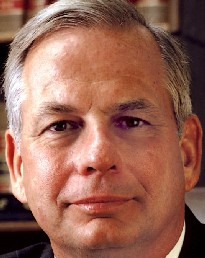Reps. Latta and Green Introduce Bill to End FCC's Integration Ban
September 26, 2013. Rep. Bob Latta (R-OH) and Rep. Gene Green (D-TX) introduced HR 3196 [LOC | WW], an untitled bill that would end the Federal Communications Commission's (FCC) integration ban for multichannel video programming distributors (MVPDs).
The FCC created integration ban currently prohibit MVPDs from making available to consumers devices that contain both navigation of video content functions and security functions.
Rep. John Shimkus (R-IL) joined as a cosponsor on September 30. The bill was referred to the House Commerce Committee (HCC). All three sponsors are members.
Bill Summary. This bill would amend Section 629 of the Communications Act, which is codified at 47 U.S.C. § 549, and which pertains to "Competitive availability of navigation devices".
Subsection (a) provides, in part, that the Federal Communications Commission (FCC) shall "adopt regulations to assure the commercial availability, to consumers of multichannel video programming and other services offered over multichannel video programming systems, of converter boxes, interactive communications equipment, and other equipment used by consumers to access multichannel video programming and other services offered over multichannel video programming systems, from manufacturers, retailers, and other vendors not affiliated with any multichannel video programming distributor."
Subsection (f) currently provides, in full, that "Nothing in this section shall be construed as expanding or limiting any authority that the Commission may have under law in effect before February 8, 1996."
This bill would change subsection (f) to read, "Except as provided in subsection (g), nothing in this section shall be construed as expanding or limiting any authority that the Commission may have under law in effect before February 8, 1996."
Then, this bill would add a new subsection (g) that would provide, in full, as follows: "Integrated Devices -- Nothing in this section or any other provision of this Act authorizes the Commission to adopt any rule or policy that prohibits a multichannel video programming distributor from placing into service navigation devices for sale, lease, or use that perform both conditional access and other functions in a single integrated device. Any such rule or policy adopted by the Commission prior to the date of enactment of this subsection shall cease to be effective on such date of enactment, and the Commission shall remove any such rule or policy from the rules of the Commission." (Emphasis added.)
 Comments on Bill. Rep. Green
(at right) stated in a
release that "The bill will unleash new innovative solutions by ridding the
rule books of an antiquated tech mandate. At the same time, the bill is a surgical
approach that preserves FCC authority in the retail set top box market."
Comments on Bill. Rep. Green
(at right) stated in a
release that "The bill will unleash new innovative solutions by ridding the
rule books of an antiquated tech mandate. At the same time, the bill is a surgical
approach that preserves FCC authority in the retail set top box market."
The National Cable and Telecommunications Association's (NCTA) Michael Powell stated in a release that "We applaud Reps. Latta and Green for introducing this important legislation. This targeted and bipartisan bill will retire an outdated FCC rule -- known as the integration ban -- that burdens cable consumers and operators with needless costs, wastes energy and violates principles of competitive neutrality. This is common sense legislation that recognizes the significant harms imposed by the integration ban, which since 2007 has forced consumers with leased set top boxes to bear over $1 billion in unnecessary costs."
John Bergmayer of the Public Knowledge (PK) stated in a release that "This bill would make it more difficult for consumers to obtain and use CableCARDs, as well as reducing CableCARD's appeal as a technology third-party developers can take advantage of. Set-top box rental fees, not CableCARD support, remain the biggest driver for consumer costs in this area. The best way forward would be for policymakers to address this problem by promoting consumer choice in video devices. Public Knowledge supports efforts to modernize the FCC's approach to this issue, and to eventually move beyond CableCARD, but this bill has very little upside."
Related Developments. The FCC advanced its "AllVid" proposal in 2010. See, Notice of Inquiry (NOI) [28 pages in PDF], adopted and released on April 21, 2010. That NOI is FCC 10-60 in MB Docket No. 10-91, CS Docket No. 97-80, and PP Docket No. 00-67. (As of publication of this issue, the FCC has taken this and other public documents offline.) See also, story titled "FCC's AllVid Proposal Disputed" in TLJ Daily E-Mail Alert No. 2,213, March 31, 2011.
However, the FCC has not yet followed up that AllVid NOI with an NPRM.
On January 15, 2013, the U.S. Court of Appeals (DCCir) issued its opinion in Echostar v. FCC, granting the petitions for review of the FCC's encoding rules for satellite companies. See, story titled "DC Circuit Grants Petitions for Review in Echostar v. FCC" in TLJ Daily E-Mail Alert No. 2,508, January 15, 2013.
On October 3, 2013, the Wall Street Journal published an article by Greg Bensinger titled "Amazon Readies Set Top Box for Holidays".
On September 20, 2013 Verizon announced in a release that its "enhanced FiOS Mobile App ... enables Verizon FiOS TV customers to watch live linear content as well as video on demand while away from home ... via select iOS and Android mobile devices and tablets, and Kindle Fire ..." There is no set top box.
On August 27, 2013 Time Warner Cable (TWC) and Microsoft announced in a release that "the TWC TV app has launched on Xbox 360 today, delivering up to 300 of the most popular TV channels to Xbox Live Gold members in the U.S. who are also TWC subscribers". There is no set top box.
(Published in TLJ Daily E-Mail Alert No. 2,609, October 7, 2013.)
